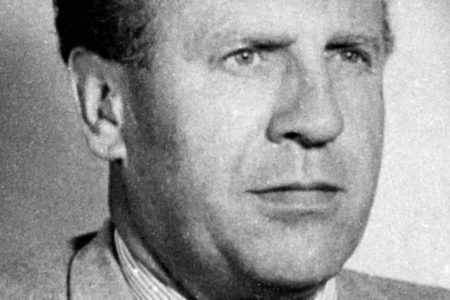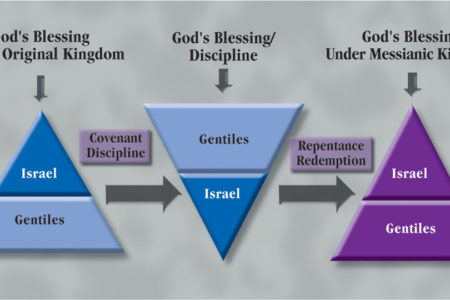God Is Triune (Theology Proper) Conclusion
In the previous article, we observed implications for the triunity of God in the Old Testament, noting how that portion of the Scriptures presents both the unity and plurality of God. Now we shall examine implications for the triunity of God in the New Testament.
The Triunity of God in the New Testament
The Unity of God. Three persons in the New Testament asserted the unity of God. First, Jesus quoted the Shema, “Hear, O Israel: The LORD our God is one LORD” (Dt. 6:4), and clearly indicated His agreement with its assertion that there is only one God (Mk. 12:29–32).
Second, the apostle Paul declared, “For there is one God” (1 Tim. 2:5). Third, James, Jesus’ half brother, wrote, “Thou believest that there is one God; thou doest well” (Jas. 2:19). He thereby commended those who believed in the unity of God.
The Plurality of God. A number of factors in the New Testament indicate that a plurality exists within the one God.
1. The title “God” is assigned to the Father, Son (Jesus), and Holy Spirit in the New Testament.
First, Jesus called the Father “God” (Jn. 6:27).
Second, the apostle John, referring to Jesus as “the Word,” stated, “the Word was God” (Jn. 1:1). With this assertion, John signified Jesus’ deity. The absence of the definite article the before “God,” both in the Greek text and English translation of John’s assertion, indicates that he was referring to kind of being—Jesus, the Word, was God-kind of being. In the same way, through the absence of the definite article before “God” in John 1:18, the apostle indicated that the Father is God-kind of being.
The writer of Hebrews, referring to what God the Father said about Jesus, His Son, wrote, “But unto the Son he saith, Thy throne, O God, is forever and ever” (Heb. 1:8). Thus, God the Father called His Son “God.” Third, when the apostle Peter confronted Ananias with his sin of lying, he indicated that he lied to God when he lied to the Holy Spirit (Acts 5:3–4). Peter thereby called the Holy Spirit “God.”
2. The New Testament indicates that the Father, the Son (Jesus), and the Holy Spirit are three distinct persons, not three manifestations of the same person.
First, in addition to stating that Jesus as the Word “was God,” the apostle John declared that He “was with God” (Jn. 1:1). John thereby indicated that Jesus was a distinct person from God the Father.
Second, the expression “But unto the Son he saith,” in the Hebrews 1:8 record of what the Father said to the Son, signifies that the Father and the Son are distinct persons.
Third, when Jesus came out of the waters of baptism, the Holy Spirit descended on Him from heaven, and the Father spoke from heaven. Concerning Jesus He said, “This is my beloved Son, in whom I am well pleased” (Mt. 3:16–17). The facts that the Son was on Earth, the Spirit descended from heaven to the Son, and the Father spoke from heaven about the Son indicate that the Father, Son, and Holy Spirit are distinct persons.
Fourth, when the angel Gabriel informed Mary that she would give birth to Jesus the Messiah, he told her that the Holy Spirit would come upon her, the power of the Highest (the Father) would overshadow her, and her holy offspring would be called the Son of the Highest, the Son of God (Lk. 1:31–35). Gabriel’s statements signified that the Father, the Son, and the Holy Spirit are distinct from each other.
Fifth, after Jesus informed His apostles that He would return to His Father’s house in heaven (Jn. 14:2–3), He told them that He would ask the Father to give them another Comforter, the Holy Spirit, to abide with them forever (Jn. 14:16–17). Through these statements, Jesus indicated that He, the Father, and the Spirit are distinct persons.
Sixth, in John 14:26 Jesus referred to the Holy Spirit, whom the Father would send in Jesus’ name. In John 15:26 He declared that He would send the Spirit from the Father, the Spirit proceeds from the Father, and the Spirit would testify concerning Him (Jesus). Once again such statements signify three distinct persons.
3. The New Testament associates the Father, Son, and Holy Spirit together in such a way as to make inequality inconsistent.
First, Jesus taught that believers are to be baptized in the name of the Father, and of the Son, and of the Holy Spirit (Mt. 28:19). None of the three is to be excluded from the baptismal formula.
Second, all three persons can be blasphemed—God the Father (Rev. 13:6), Jesus the Son (Lk. 22:63–65), and the Holy Spirit (Mt. 12:31).
Third, Jesus asserted that He, the Father, and the Holy Spirit would abide with believers (Jn. 14:16–17, 23).
Fourth, all three are included in the benediction in 2 Corinthians 13:14: “The grace of the Lord Jesus Christ, and the love of God, and the communion of the Holy Spirit be with you all. Amen.”
Fifth, all three can give life— God the Father (Jn. 5:21; Acts 17:24–25), Jesus the Son (Jn. 5:21; 6:33; 14:6), and the Holy Spirit (Jn. 6:63; Rom. 8:2; 2 Cor. 3:6).
Sixth, all three are associated with truth. God the Father is true (Jn. 3:33), and His Word is truth (Jn. 17:17); Jesus is the truth (Jn. 14:6); and the Spirit is truth (1 Jn. 5:6) and is called “the Spirit of truth” (Jn. 14:17; 15:26; 16:13).
Seventh, all three are eternal. God the Father is “the King eternal” (1 Tim. 1:17), and the Holy Spirit is “the eternal Spirit” (Heb. 9:14). The Son existed with God the Father before everything that had a beginning, and He did the work of creation (Jn. 1:1–3; Col. 1:16–17; Heb. 1:1–2).
Eighth, all three are called “Lord.” God the Father is called Lord by Jesus (Mt. 4:7, 10; 11:25) and others (Acts 2:39). Jesus the Son is called Lord by many people (Mt. 15:22; 16:22), and the Holy Spirit is called Lord by the apostle Paul (2 Cor. 3:17–18).
Ninth, all three are holy. Jesus addressed God as “Holy Father” (Jn. 17:11). The apostle Peter declared that God is holy and quoted God’s personal claim of holiness (1 Pet. 1:15–16), and angels in heaven continually ascribe holiness to God day and night (Rev. 4:8). The angel Gabriel ascribed holiness to Jesus, the Son of God (Lk. 1:35); demons called Jesus “the Holy One of God” (Mk. 1:24); and believers ascribed holiness to Him (Acts 4:27, 30). Holiness is ascribed to the Spirit more than ninety times in the New Testament. For example, both an angel (Mt. 1:20) and Jesus (Lk. 11:13) called Him “the Holy Spirit.”
Tenth, all three are associated with glory. The apostle Paul called God “the Father of glory” (Eph. 1:17), and heavenly creatures give glory to God as He sits on His throne (Rev. 4:9) and declare that He is worthy to receive glory (Rev. 4:10–11). The apostle Paul called Jesus “the Lord of glory” (1 Cor. 2:8). Jesus talked about the glory that He had with the Father before the world existed (Jn. 17:5). Peter, James, and John saw the shekinah glory of God shine from Jesus’ flesh and clothing when He was transfigured before them (Mt. 17:1–6; Jn. 1:14). The writer of Hebrews declared that God’s Son was the brightness of God’s glory (Heb. 1:3). The apostle Peter called the Holy Spirit “the Spirit of glory” (1 Pet. 4:14).
Eleventh, all three are associated with miraculous signs. God enabled Paul and Barnabas to perform miraculous signs (Acts 15:12). The Holy Spirit empowered Paul to execute miraculous signs (Rom. 15:19). Jesus, the Son of God, performed many miraculous signs (Jn. 7:31; 20:30–31), and He gave His apostles the power to do the same (Mt. 10:1, 8).
4. The New Testament has no fixed order in presenting these three persons.
The order in Matthew 28:19 is the Father, the Son, and the Holy Spirit. The order in 2 Corinthians 13:14 is the Lord Jesus Christ, God, and the Holy Spirit. In Ephesians 4:4–6, the order is Spirit, Lord, and God the Father. The order in 2 Thessalonians 2:13–14 is God, the Spirit, and the Lord Jesus Christ. In Jude 20–21, the order is the Holy Spirit, God, and the Lord Jesus Christ.
The fact that the New Testament has no fixed order in presenting God the Father, Jesus the Son, and the Holy Spirit implies that they are equal to each other in personhood and nature.
5. The New Testament indicates that the Son has equal blessing, honor, glory, and power with God the Father.
First, Jesus declared, “All men should honor the Son, even as they honor the Father. He that honoreth not the Son honoreth not the Father, who hath sent him” (Jn. 5:23).
Second, the New Testament portrays all of creation giving the same everlasting blessing, honor, glory, and power to God who sits upon His throne and to the Son,
God’s ultimate sacrificial Lamb for the sins of the world (Rev. 5:13).
6. The New Testament signifies that Jesus the Son has the same divine essence or nature as the Father.
First, the New Testament teaches that only God is to be worshiped. No creatures are to be worshiped (Rom. 1:25–26; Rev. 22:8–9). Yet God the Father commanded all the angels to worship His Son (Heb. 1:6), and Jesus accepted worship from people (Mt. 9:18; 14:33).
Second, Jesus claimed to have the same divine essence or nature as the Father. He declared, “I and my Father are one” (Jn. 10:30); and He said, “I am the Son of God” (10:36). His enemies recognized these were assertions of equality with God in essence or nature (Jn. 5:18; 10:33, 36). A former enemy came to recognize that He did possess the divine nature in all its fullness (Col. 2:9).
Conclusion
The Old and New Testaments clearly teach that there is only one true God, but they indicate that a triunity—a plurality of three distinct persons in one, all equal in personhood and nature—exists within the one God. The Scriptures reveal that the Son and the Spirit are voluntarily submissive to the Father’s will (Jn. 5:30; 6:38; 7:16; 8:28–29; 14:16, 26; 16:13; 1 Cor. 11:3). This submissiveness does not indicate inequality of personhood or nature. It is purely a functional submissiveness. In any unit of several persons equal in personhood and nature, one person must exercise functional headship; and the other persons must voluntarily submit to that headship if the unit is to function effectively.







